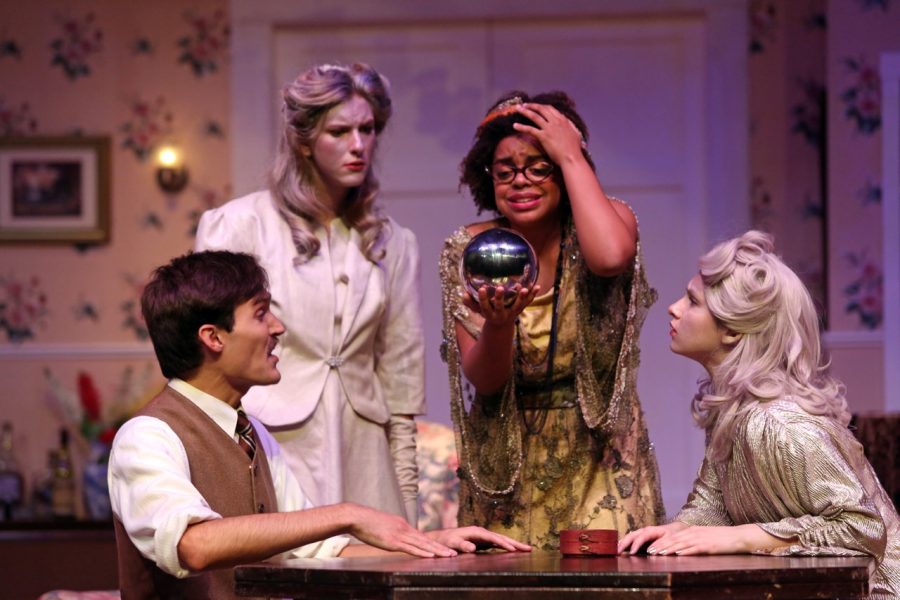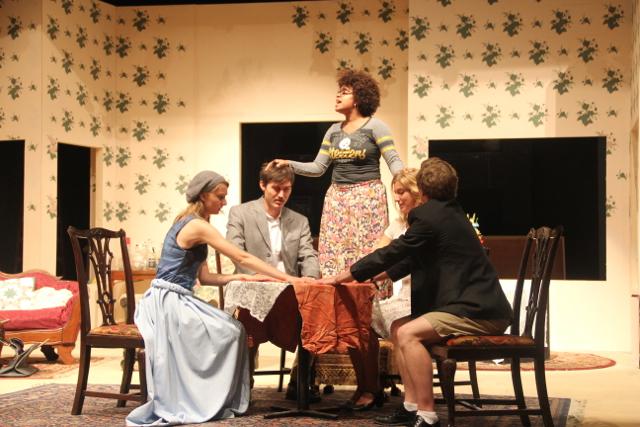The question journalist Barbara Ehrenreich set out to answer seemed simple: can a single woman work and live on minimum wage for a month? And the answer was no.
Now, the story of Ehrenreich’s struggle to survive on minimum wage has come to Marquette with the Department of Performing Arts’ production of “Nickel and Dimed,” opening Thursday at the Helfaer Theatre.
The play, adapted by Joan Holden from Ehrenreich’s book of the same name, details Barbara’s undercover travels to three states — Florida, Maine and Minnesota — and her attempt to live alone on minimum wage for a month.
In the play, Barbara, a journalist and social critic, initially believes herself to be the wrong candidate for such a role, going so far as to tell her publisher, “You need someone who’s gonna be shocked.” However, it turns out Barbara can still be surprised by the hardships of everyday life for the working poor.
Initially, Barbara sets all sorts of rules for herself so she can make it through comfortably. She’ll never be without a car, she’ll never be homeless, she won’t be a waitress, she won’t share an apartment with anyone — the list goes on and on.
But what Barbara finds in her time on minimum wage is that those rules aren’t keeping her comfortable — quite the opposite, in fact. She caves and becomes a waitress early on in the play, and soon realizes that cars and apartments all cost money that she can barely earn week-in and week-out.
If you’re thinking the play sounds pretty depressing at this point, you’ll be surprised at director James Bailey’s characterization of it as a comic drama.
“It’s definitely not a drag,” said Bailey, a Marquette alumnus and guest director for the show. Bailey said the play is filled with comedic elements, and the original book had a sense of humor to it that has been carried through to the stage version.
“It’s very entertaining and funny, but it’s a play that makes you think,” Bailey said.
Bailey, who founded ComedySportz Los Angeles in 1988, said his intent with the show was to convey the reality of the situations people face every day. Ironically, this need to portray many different scenes realistically requires the play to be done in what Bailey calls a “theatrical” sense, with actors making scene and costume changes on stage in front of the audience.
The set itself consists of a blank stage, filled with only the necessary props and a set of moving panels that resemble barcodes. When Barbara is away from her minimum wage life, these panels stay off in the wings. As soon as she returns, though, the panels swing in and create a sense of imprisonment.
“We were trying to make the world feel confined,” Bailey said, adding that the panels’ similarity to barcodes was unintentional. He and the cast noticed the resemblance only after the panels were built.
The play’s cast is also minimalistic, with 10 actors playing more than 40 individual roles. The only cast member with just one character to portray is College of Communication senior Jessica Orr, who plays Barbara.
Orr said one thing that was hard to get used to with Barbara’s character was breaking the fourth wall, a practice in which she speaks directly to the audience. It’s necessary in this play due to a number of monologues pulled directly from the text of Ehrenreich’s book, and it also allows Barbara to step out of the present action for a moment and provide asides and comedic commentary.
In order to find Barbara’s “voice,” Orr read Ehrenreich’s book before rehearsals began, but said the biggest struggle was adjusting from thinking about how to play Barbara to just doing it.
“You can’t think about it, you just have to feel it,” Orr said.
Unlike Orr, the remainder of the cast had multiple personalities to take on during the show. College of Communication senior Charlie Bury, for example, plays both a 19-year-old immigrant from the Czech Republic working at “Kenny’s” and a number-crunching manager at “Mall-Mart” (both thinly veiled references to the actual establishments where Ehrenreich worked).
Bury said the roles were perfect for him because he loves doing accents. His challenge was not getting into the characters, but getting into the set.
“It’s hard to get used to,” Bury said, referring to the mazelike panels and need to pantomime many of the play’s actions. “You have to get into your imagination.”
Not every pairing is as dramatically opposite as Bury’s, however. College of Communication sophomore Allie Bonesho’s main characters — a young, pregnant “Magic Maid” and an older, born-again Christian at “Mall-Mart” — may seem contrasting, but Bonesho believes they fulfill similar roles in the show.
“They both kind of teach Barb something,” Bonesho said. “It’s sort of ironic that they are paired together.”
Bonesho said she was able to connect with the show easily because of her experience with Marquette’s Service Learning program. In one particular instance, she said, she encountered a woman who was looking for the exact same jobs she was portraying: a housekeeper or a retail employee. The incident reminded her of the accuracy of the show and its conclusions.
It’s a sentiment Orr agrees with, and partly why she feels this play is such an important one for Marquette students to see.
“This is a story that needs to be told,” Orr said.
For Bailey, the show is exactly what he always strives for on stage: to get people thinking and talking about what they’ve seen.
“I always want to leave a show talking about it,” Bailey said, “and this show is one you’ll be talking about.”
“Nickel and Dimed” will be playing at the Helfaer Theatre Feb. 11 to 14 and Feb. 17 to 21. Tickets are $9 for students, $15 for university employees, alumni and senior citizens, and $19 for general seating. Students can buy two tickets for $12 on Feb. 17, and both Friday shows are “Philanthropy Fridays,” with $1 from every ticket sold contributing to Haitian earthquake relief.











MU alum • Feb 17, 2010 at 11:00 am
I saw the Marquette Theater production of Nickel and Dimed. I thought it was very well done! Impressive acting! Good characters. Congratulations, Marquette theater students. I read Ehrenreich’s book a while ago and think she would be proud of the way her story was told by all of you on stage.
City Slicker • Feb 15, 2010 at 11:53 am
I saw Nickel and Dimed twice at MU this week. I thought it was fantastic! It really made me think about the millions of people in this country who are barely scraping along. It was both funny and sad. Very well done. Kudos to Mr. Bailey and the student actors on a wonderful job.